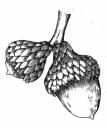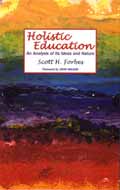|
Book Review of HOLISTIC EDUCATION: An
Analysis of Its Ideas and Nature, by Book Review by Patricia Enlgish Not every doctorial dissertation, even one emanating out of Oxford University, accomplishes the difficult transition from scholarly tome to essential educational text, especially one that proves suitable for undergraduates and graduates alike. Holistic Education - An Analysis of Its Ideas and Nature by Scott H. Forbes is a notable exception and likely to be of immense interest to educational leaders and administrators as well as concerned parents. Forbes' selection of material is as exciting and intriguing as it is useful. Even better, it comes upon the market at a time when students, teachers and lecturers are reeling under the pressures of exponential social change and rampant economic rationalism. In such a climate it is hardly surprising to find that there are many educators who believe that these influences threaten the very existence of education as a professional enterprise. For these practitioners Forbes' book will do much to counteract the tide of negative sentiment. In the foreword to this book, John Wilson of Oxford University, claims that Forbes provides us with "the best (perhaps the only) attempt to give the idea and practice of holistic education a serious philosophical underpinning". If this statement be true, students of education can breathe a sigh of relief because Forbes' book provides a solid philosophical foundation which will raise holistic education above the level of attitudes, intuitions and feel-good practices and theories which have arguably hindered innovative education in the past few decades. Furthermore, and perhaps more importantly, practitioners who have been influenced by the advocates of humanistic education, and who have drawn upon their perspectives in teacher education courses, can now avail themselves of a substantial philosophical base upon which empirical studies into aspects of holistic education can be formulated and successfully conducted. Forbes defines holistic education in terms of what it "does" and what it "thinks" and he has organised his exploration into three major sections which may be read separately, according to the purposes of the reader, or read as an entire work. This reviewer believes that the work is more valuable when read in its entirety, mainly because of the organising principle that dominates the structure of the book as well as the clarification of terminology which is enunciated clearly and fully in the opening chapter and which is employed eloquently and consistently throughout each section of the entire work. The book itself is divided into three sections. Section I is concerned with a general overview of holistic education, while Section II deals with its philosophical precedents. (Please note that this section comes with a wonderfully extensive appendix which is worth reading for its own sake). Section III is concerned with examining what
holistic education actually "does" and involves a sociological
analysis which draws heavily upon the work of Basil Bernstein,
whom the author was fortunate to have as a discussion partner
during his term at Oxford. This section is primarily concerned
with the examination of the three competence based modes of pedagogy
identified by Bernstein, together with a well argued case by Forbes
for holistic education to be considered as a fourth mode in the
competence based pedagogic model. I also felt that both Forbes and Bernstein were a bit too hard on mainstream education as a whole, especially when so many teacher education courses in Australia have tried to accommodate not only the individual differences of students, but also to design curricula which allow the maximum freedom of choice and delivery. To a greater or lesser extent, education at all levels has been positively influenced by holistic perspectives. On the other hand, perhaps I am being unnecessarily defensive, because I realise, as many practitioners do, that government policies make it virtually impossible to achieve a truly authentic, holistic educational system and not solely because of economic constraints. Besides, in a social environment heavily influenced by political correctness, what government would be brave enough to introduce an education system which encourages students to develop into responsible, autonomous thinkers? Almost everyone acknowledges that it is much easier (and cheaper) to "dumb down" the educational enterprise than it is to allow its citizens to develop to their full potential as human beings. The real question for modern educators though, is whether we are prepared to allow this to happen and what steps can be taken to constructively prevent it. At least in Western Australia, where there is still a good deal of autonomy in schools (and this may apply in other States as well) it might be possible - in view of Forbes' establishment of a philosophical base - to utilize some of this autonomy to trial holistic educational programs in government schools. Even if this does not eventuate, educators and trainee teachers will find Forbes' book invaluable in clarifying their own thinking about holistic education and in developing the necessary intellectual philosophical understandings which should underpin all educational innovation, whether that innovation occurs within the broad spectrum of holistic education or outside of it. In his book, Forbes examines the goals of holistic education in terms of Ultimacy (a term first coined by Paul Tillich) and he uses this term in a broad sense to refer to (a) "the highest state of being that a human can aspire to, either as a stage of development (e.g., enlightenment) or as a moment of life that is the greatest but only rarely experienced by anyone (e.g., grace), or as a phase of life that is common in the population but usually rare in any particular individual's life (e.g., Maslow's peak experience); and (b) a concern or engagement that is the greatest that a person can aspire to (e.g., being in service to something sacred)". The adoption of the term Ultimacy was made on
the grounds that it incorporates both an end-state and a process
which can be used interchangeably or stand alone. It is a term
which encompasses religious as well as psychological perspectives
and easily accommodates theories of human development. Using the above intellectual framework, Section II is concerned with an analysis of the ideas of holistic education through an examination of six founding authors deemed to have made a unique contribution to the understanding and development of holistic education, referred to throughout the book as The Authors. The six authors selected are Jean-Jacques Rousseau, Johann Pestalozzi, Friedrich Froebel, Carl Gustav Jung, Abraham Maslow, and Carl Rogers. The work of each author is examined in terms of ultimacy, competence, student characteristics and teachers' understanding in relation to the educational enterprise. The inclusion of Jung in this esteemed line-up may seem at first discordant, but when one considers the breadth and depth of his psychological contribution to our understanding of what it means to be human, it turns out to have been an extremely good choice. I suspect that quite a few graduate students will be pointed in a direction that will prove fascinating and enthralling for them if they are looking for areas in which to conduct empirical research. The same may also be said for Section III where the work of Basil Bernstein is used to conduct a sociological analysis in which holistic education is examined in terms of what it does. Although, from previous comments, it may be deduced that this reviewer is not a Bernstein fan, I defy any educator not to be stimulated and provoked by this section of the book. A controversial and contentious character like Bernstein is just what is needed to refine our critical endeavours. If teachers and students do not feel passionately
about what they are doing in the classroom, or whatever constitutes
for them the educational environment, then what hope is there
of ever changing or transforming our human condition? And, who
among us would want to argue that it does not need changing, and
perhaps, radically so? There is no doubt, at least in my mind, that Scott H. Forbes' work will become a touchstone for all those researchers and scholars alike, who dare to believe that education, in the fullest and deepest sense of that word, can lead to the awakening of true human intelligence. Patricia English |
The
highest function -J. Krishnamurti Book Review
by |

